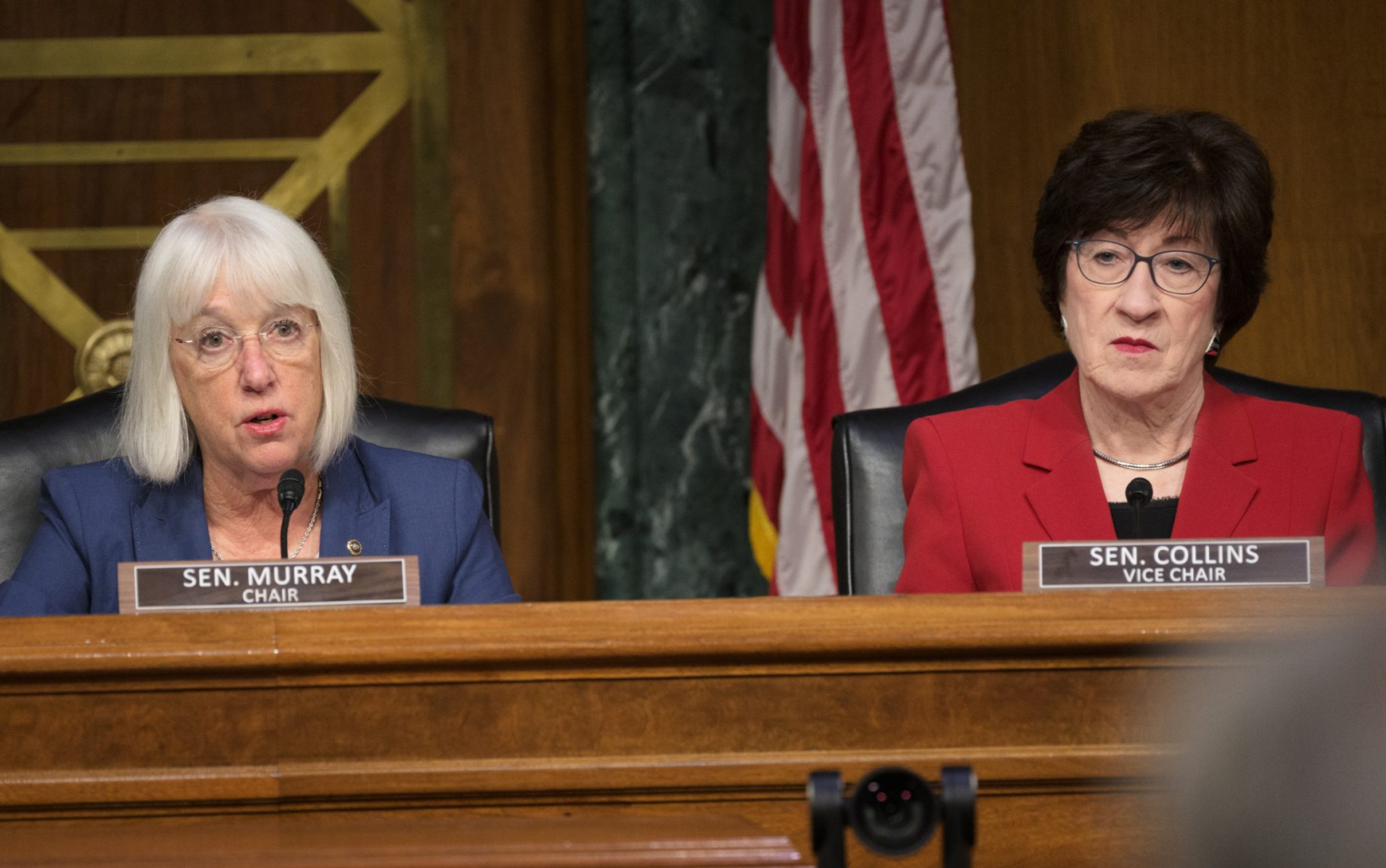| |
| FYI: Science Policy News from AIP |
| THIS WEEK |
|
|
|
|
|
|
| What’s Ahead |
 |
| Senate Appropriations Committee Chair Patty Murray (D-WA) and Ranking Member Susan Collins (R-ME). (Senate Appropriations Committee) |
Congress Queuing Up Science Budget Bills Ahead of August Recess
This week of congressional business is scheduled to be the last before the month-long August recess. The Senate Appropriations Committee will meet on Thursday to advance spending bills covering the Department of Defense, National Institutes of Health, and U.S. Geological Survey, completing the committee’s work on fiscal year 2024 spending legislation. The committee advanced its spending bill for the Department of Energy last week on a unanimous vote and its proposals for other science agencies earlier in the month on a 28-1 vote. The DOE bill proposes to increase the Office of Science budget by 4% to $8.4 billion, whereas the counterpart House bill proposes flat funding. The bills also diverge in their proposals for DOE’s applied energy R&D offices, with the Senate favoring renewable energy programs while the House prioritizes nuclear energy.
The Senate has so far taken a bipartisan approach to developing its spending bills and opted to add $14 billion of “emergency” funding above the budget cap negotiated by President Biden and House Speaker Kevin McCarthy (R-CA). Meanwhile, House Republicans have proposed reducing spending to levels significantly below the negotiated cap and included provisions in their spending bills that would restrict federal diversity initiatives, leading Democrats to vote against the bills. The House plans to begin floor votes on its spending bills this week. Notwithstanding Biden and McCarthy’s agreement, the divergence between the House and Senate proposals could make it difficult for negotiators to finalize spending legislation this fall.
Senate NDAA Approaching Finish Line
Floor debate continues this week on the Senate version of the National Defense Authorization Act as senators sift through almost 900 proposed amendments. Among amendments included in the version of the bill introduced on the floor last week is the bipartisan ADVANCE Act, which aims to streamline regulatory approval of new nuclear reactor designs. One of the first amendments coming up for a vote this week is a bipartisan measure requiring U.S.-based entities to disclose investments in foreign companies related to various strategic technology areas, a stripped-down version of an earlier proposal to create a mechanism for prohibiting any such investments deemed detrimental to national security. The White House is preparing an executive order it aims to have ready by September to implement such “outbound” reviews on investments in China in targeted technology areas, likely including quantum computing and advanced semiconductors. The House has already passed its separate version of the NDAA, which is likely to be integrated with the Senate version through a conference committee this fall. The White House indicated last week that among the House provisions it “strongly opposes” is one that would require university researchers the Defense Department funds to publicly disclose extensive information about themselves including various sorts of ties to foreign countries.
House Committee Probing Venture Firms, UC Berkeley Over China Ties
The House Select Committee on the Chinese Communist Party will hold a hearing on U.S.-China competition over critical and emerging technologies on Wednesday. The witnesses are Josh Wolfe of Lux Capital, an emerging technology investment firm; Lindsay Gorman, an expert in U.S.–China technological competition at the German Marshall Fund; and William Evanina, the former director of the National Counterintelligence and Security Center. Last week, the committee opened a bipartisan investigation of several venture capital firms for investing in artificial intelligence, semiconductor, and quantum technology companies with alleged ties to the Chinese military or that have been implicated in human rights abuses. Separately, committee Republicans launched an investigation last week into the University of California, Berkeley over a joint research institute it operates with Tsinghua University in China, asserting the collaboration gives the Chinese government “easy access to Berkeley research and expertise” that it can turn to that country’s economic, technological, and military advantage. In a statement to the New York Times, Berkeley indicated it was cooperating with the investigation and emphasized, “As a matter of principle, Berkeley conducts research that is openly published for the entire global scientific community.”
Science Committee Delves Into Geothermal Technology
The House Science Committee is holding a hearing on Wednesday to review the status of subsurface science and technology, focusing on geothermal research activities supported by the Department of Energy. Among the witnesses is an official from Fervo Energy, a company that last week reported the demonstration of an “enhanced” geothermal system that can recover enough heat from deep beneath the surface to enable commercially viable power production at a wide range of sites. To date, geothermal power generation has only been economical at sites with heat close to the surface, but such enhanced systems could increase geothermal energy’s ability to contribute larger amounts of baseload power to the electric grid. The hearing’s other witnesses are from DOE’s National Energy Technology Lab and Pacific Northwest National Lab, MIT, and the drilling company Baker Hughes.
Science Advisory Panels Convening
Various federal science advisory committees are meeting this week, including the President’s Council of Advisors on Science and Technology and the highest-level advisory panels for the Department of Energy and National Oceanic and Atmospheric Administration:
|
|
| In Case You Missed It |
 |
| John Sarrao (Los Alamos National Lab) |
Senior Los Alamos Official John Sarrao Picked as SLAC Director
SLAC National Accelerator Laboratory announced last week that physicist John Sarrao will take the lab’s helm starting Oct. 2. Sarrao currently is the deputy director for science, technology, and engineering at Los Alamos National Lab, overseeing five research directorates. An expert in condensed matter and materials science, he received a doctorate from the University of California, Los Angeles in 1993 and joined Los Alamos as a staff scientist four years later. He has since held various leadership positions at the lab, including associate director for theory, simulation, and computation. At SLAC, he will succeed Chi-Chang Kao, an X-ray scientist who led the lab for more than a decade before announcing last fall he would return to a research role. Since February, the lab has been led on an interim basis by Stephen Streiffer, vice president for SLAC at Stanford University, which operates the lab for the Department of Energy.
NASA Appoints New Head for Biological and Physical Sciences Division
Last week, NASA appointed Lisa Carnell as director of the Science Mission Directorate’s Biological and Physical Science Division, which supports experiments conducted aboard the International Space Station and other platforms. The division’s work has recently focused on two priorities: quantum science and biological investigations related to living in deep space. Carnell has served since 2018 as the division’s program scientist for translational research, leading partnerships with other federal agencies and commercial engagement initiatives. She previously led the Space Radiation Medical Countermeasure program within NASA’s Human Research Program. Carnell joined NASA as a materials research engineer in 2009 after receiving a doctorate in engineering from Duke University. BPS Deputy Director Diane Malarik has been leading the division on an acting basis since the previous director, Craig Kundrot, retired early this year.
HHS Moves to Ban Funding for Wuhan Institute of Virology
The Department of Health and Human Services suspended all funding for the Wuhan Institute of Virology on July 17 and proposed debarring it from eligibility for future funding. The memorandum declaring the decision explained the institute was unresponsive to requests for documentation related to alleged violations of biosafety protocols requiring immediate reporting and cessation of experiments in which modified viruses exceed defined benchmarks for population growth. The National Institutes of Health revoked a grant to EcoHealth Alliance, a U.S.-based research organization, early in the COVID-19 pandemic as political pressure mounted surrounding suspicions the pandemic originated at WIV, which received NIH funds through EcoHealth for work on bat-borne coronaviruses. NIH recently restarted that grant without the component that funded WIV.
HHS did not cite the pandemic origins issue in its decision and U.S. intelligence agencies have not assigned high confidence to their assessments of the pandemic’s origins, reporting they have no “direct evidence that a specific research-related incident occurred involving WIV personnel before the pandemic that could have caused the COVID pandemic.” However, a special panel of the House Oversight Committee has been probing scientists’ communications from early in the pandemic seeking evidence of a concerted effort to suppress consideration of a laboratory origin. Republicans in Congress are also leading efforts to expand restrictions on research collaboration with China, including through a provision in the House version of the National Defense Authorization Act that would generally prohibit the Defense Department from funding any bilateral cooperative biomedical research program between a U.S. entity and “China-affiliated organizations.”
|
|
| Events This Week |
|
All times are Eastern Daylight Time, unless otherwise noted. Listings do not imply endorsement.
Monday, July 24
Tuesday, July 25
Wednesday, July 26
Thursday, July 27
Friday, July 28
No events start today.
Monday, July 31
Know of an upcoming science policy event either inside or outside the Beltway? Email us at fyi@aip.org.
|
|
| Opportunities |
DOE Hiring Director for National Energy Technology Lab
The Department of Energy is hiring a director for the National Energy Technology Laboratory. Candidates should have extensive leadership experience within science and engineering organizations, including experience managing major R&D programs focused on the development and deployment of new energy technologies, sources, and infrastructure. Applications are due Aug. 7.
SpaceX Hiring Satellite Policy Advisers
SpaceX is hiring for two positions on the policy team for Starlink, the company’s satellite internet constellation. Both roles will represent the company before government agencies, particularly the Federal Communications Commission and the National Telecommunications and Information Administration. Candidates for the policy associate position must have a bachelor’s degree and at least two years of industry experience, while policy adviser candidates should have a law degree and at least four years of experience.
New Climate Fellowship Program Seeks Congressional Affairs Officer
The National Academies is hiring a congressional affairs officer to develop and lead a new bipartisan, bicameral climate fellowship program for congressional staff. The program is intended to promote “science and analysis-informed decision making across a broad spectrum of issues relevant to climate change.” Candidates must have at least eight years of related professional experience, preferably including at least four years of experience working as a senior congressional staff member or managing fellowship programs.
Know of an opportunity for scientists to engage in science policy? Email us at fyi@aip.org.
|
|
| Around the Web |
|
News and views currently in circulation. Links do not imply endorsement.
White House
Congress
Science, Society, and the Economy
Education and Workforce
Research Management
Labs and Facilities
Computing and Communications
Space
Weather, Climate, and Environment
Energy
Defense
Biomedical
International Affairs
|
|
|
| |
| This message is sent to you because you signed up for one of our newsletters. To manage your AIP email preferences and newsletter subscriptions ( add or remove ), please click here. Or to automatically unsubscribe from all AIP emails, click here. As a 501(c)(3) non-profit, AIP is a federation that advances the success of our Member Societies and an institute that engages in research and analysis to empower positive change in the physical sciences. The mission of AIP (American Institute of Physics) is to advance, promote, and serve the physical sciences for the benefit of humanity.
|
|
| © 2025 American Institute of Physics. |
AIP, 1 Physics Ellipse, College Park, MD 20740-3841
301.209.3100 - newsletters@aipcomm.org |
|
|